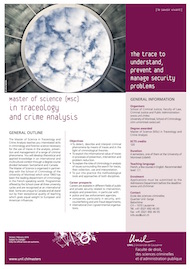Master of Science (MSc) in Crime Data Analysis and Traceology
Presentation
The Master of Science in Crime Data Analysis and Traceology provides cross-disciplinary training in the criminological sciences and data analysis. You will develop a unique skillset, combining complementary approaches and areas of expertise to analyse crime and security issues at a time when society is increasingly driven by digital technology.
The Master of Science is organised in partnership with the School of Criminology of the University of Montreal which is the leading department of criminology in the French-speaking world. Programmes offered by the School cover all three university cycles and are recognised at an international level. Some are unique to Canada and all stand out by their exceptional quality of teaching which gives equal weight to European and American influences.
Organiser
School of Criminal Justice
Faculty of Law, Criminal Justice and Public Administration
University of Montreal, School of Criminology
Degree awarded
Master of Science (MSc) in Crime Data Analysis and Traceology
ECTS credits
120
Duration
4 semesters, one of them at the University of Montreal
Teaching language
French. Recommended level : C1. A very good understanding of English is necessary, since most criminology literature is published in English and a few block courses are given in English.
Admission requirements
Applicants must be the holders of a Bachelor of Science in Forensic Science or a Master of Law in Criminology and Security. A different degree or university qualification may be deemed equivalent and allow access to the Master of Science with or without conditions. Equivalence is determined by the School (info.esc@unil.ch), subject to the candidate’s formal admissibility for the Master of Science.
Enrolment
Applications must be submitted to the Admissions Department before the deadline
Final enrolment dates
The degree course begins in the autumn semester only. Final enrolment date: 30 April. Candidates needing a visa to study in Switzerland: 28 February.
More information
Course description
You will develop theoretical and applied knowledge that will allow you to identify security issues and problems in an international and multicultural context through a degree course divided between Switzerland and Canada.
In addition to these specific skills, university studies develop a great many transverse skills: oral and written communication, critical, analytical and summarising faculties, abilities in research, and so on.
These panoply of skills prepares to careers in different fields of public and private security related to intervention, analysis and prevention, in particular with:
- police, law enforcement and penalty enforcement organisations;
- public administrative bodies, authorities and private data collection and analysis organisations;
- companies, particularly in security, anti- counterfeiting and anti-fraud departments;
- international (non-)governmental organisations.
Alumni move into a wide variety of roles, for example as an analyst in an insurance company.
Subject to changes.
The French version prevails. Only the official texts should be considered binding.
Last update: 26 March 2024

